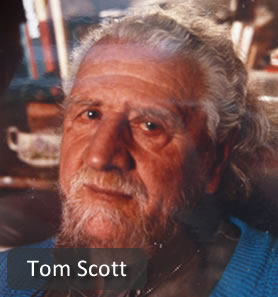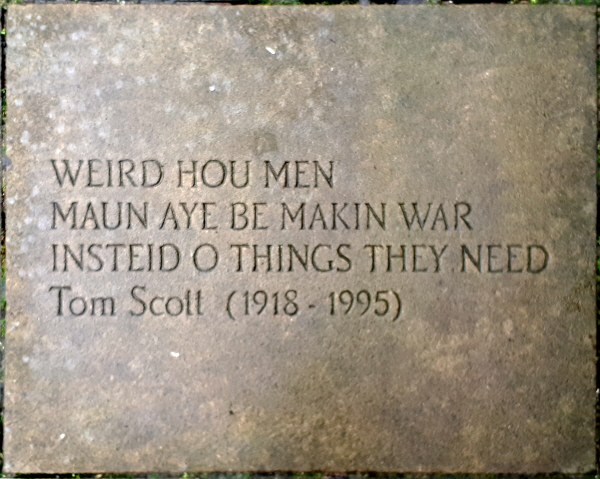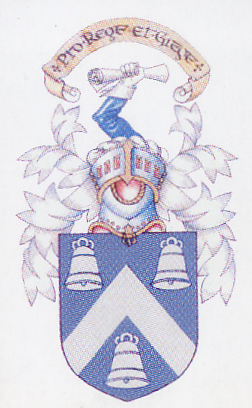| Tom Scott (1918-95) was
one of the major 20th-century poets in Scots, a leading member of
the second generation of Scottish Renaissance writers, and an
important scholar of Scottish medieval verse. Beginnings
Tom Scott was born in Partick, Glasgow, son of a shipyard
boilermaker. When Scott’s father lost his job in the slump of 1931,
he moved the family to St Andrews to work for Scott’s maternal
grandfather, a master builder. Scott attended Madras College, St
Andrews, leaving school at fifteen to work as a butcher’s messenger
boy and as a labourer in his grandfather’s building firm. |
 |
D'Arcy Wentworth Thompson,
professor of zoology at St Andrews University, noticed him on his bicycle
round, looking intently at a bird. Thompson got chatting to him and was
impressed by the intellectual curiosity of a working-class lad who knew
nothing of the rarefied life of the official students. Scott often
recorded his debt to Thompson's tutelage.
When World War II broke out, Scott was assigned to the pay corps, first in
Perth then Manchester, where bombing raids inspired his first published
poem Sea Dirge: A Mither's Keenin (1941). The first version of that
poem was in English, but Scott later realised that the rhythm of it was
that of Scots and he altered the spelling accordingly.
I found him dround on the rock that nicht
and the wind high. Munelicht it wes,
and the hungry suckin of the sea at
ma feet
streikin awa in front o me.
Scott was subsequently posted to Lagos, Nigeria. After the war, he lived
for several years in London, working as a film extra at Ealing Studios and
befriending W. S. Graham and G. S. Fraser and other poets associated with
the New Apocalypse movement. He returned to Scotland in 1952 to study at
Newbattle Abbey, an adult education college in Midlothian, under the
wardenship of Edwin Muir. He went on to attend Edinburgh University,
achieving a First Class degree in English and completing a PhD on the
medieval Scots makar William Dunbar.
The Poet
Scott’s first poems were in English but in the early 1950s he became
interested in the Scots verse tradition, discovering both the makars
(Dunbar, Henryson, Gavin Douglas) and the poets of the interwar Scottish
Literary Renaissance. He had begun as a singer and had a beautiful tenor
voice; it is the music of his poetry that will make it endure. As he often
said, "Poetry is verse that sings with its own unique music." His first
major work in Scots was a volume of translations from the 15th-century
French poet François Villon, Seeven Poems o Maister Francis Villon
(1953), which was praised by both T. S. Eliot and Ezra Pound. His first
original publication in Scots was An Ode til New Jerusalem (1956),
inspired by his lifelong faith in Socialism. Scott believed that only the
long poem could offer an integrated vision of life, and spent the
following years working on The Ship, where the sinking of the
Titanic serves as an allegory for the economic and social decline of
Europe. It was finally published to great critical acclaim in 1963. His
next work, At the Shrine of the Unkent Sodger (1968), was a volume
of satirical anti-war lyrics. He returned to the longer form with the
partly autobiographical Brand the Builder (1975), where the decline
of St Andrews is symbolical of the waning of Scottish culture in the wake
of the Protestant Reformation and Union with England. Scott’s later works
include two further book length poems, The Tree (1977), a
meditation on evolution, and The Dirty Business (1986), again
inspired by Scott’s pacifism. His shorter lyrics, published in literary
journals through his life, were anthologized as Collected Shorter Poems
(1993).
"The Annunciation" is short enough to quote in its entirety:
You'll lig your waddin-nicht yourlane
Your legs aspar ti nocht but air,
And it will get in ye a son
Yet never pairt your maiden hair.
Ye'll hain yersel baith nicht and morne
And letna your guidman steir ye, will ye,
Afore the ferlie bairn is born
And broached your virgin nipples til ye.
Tak tent nou, I maun gang my road:
Ilka word I've said is true.
And aa I've ever envied God
Is the bairnin o a lass like you.
The Scholar
Scott’s PhD on Dunbar evolved into the major monograph Dunbar: a
Critical Exposition of the Poems (1966). He also worked throughout his
life on a comprehensive history of Scots literature which never found a
publisher. The opening chapters have recently been made available online
by the Robert Henryson Society (see link below). Scott’s passion for the
makars is also reflected in his anthology Late Medieval Scots Poetry
(1967). Scott taught literature for the Open University during the 1970s
but largely earned his living as a freelance writer. As a respected
critic, he was asked to edit the Oxford Book of Scottish Verse
(with John MacQueen, 1966) and Penguin Book of Scottish Verse
(1970), both of which exerted a great influence on how Scottish poetry was
read over the coming decades.
The Translator
Scott saw his poetry, and that of the medieval makars, as belonging firmly
to the European tradition. Having made his poetic debut in Scots with a
translation from Villon, he went on to publish masterful
translations of many other major European poets, including Dante,
St John of the Cross, Baudelaire, and Ungaretti.
Recognition
Scott’s poetry was the subject of special issues of the literary journals
Chapman (Spring 1987) and Agenda (1992). Some of his verse
has been translated into Italian by Enzo Bonventre and Carla Sassi.
A flagstone in Makar's Court, Edinburgh quotes lines from Brand the
Builder:
|
|
Weird hou men
Maun aye be makin war
Insteid o things they need |
 |
|

